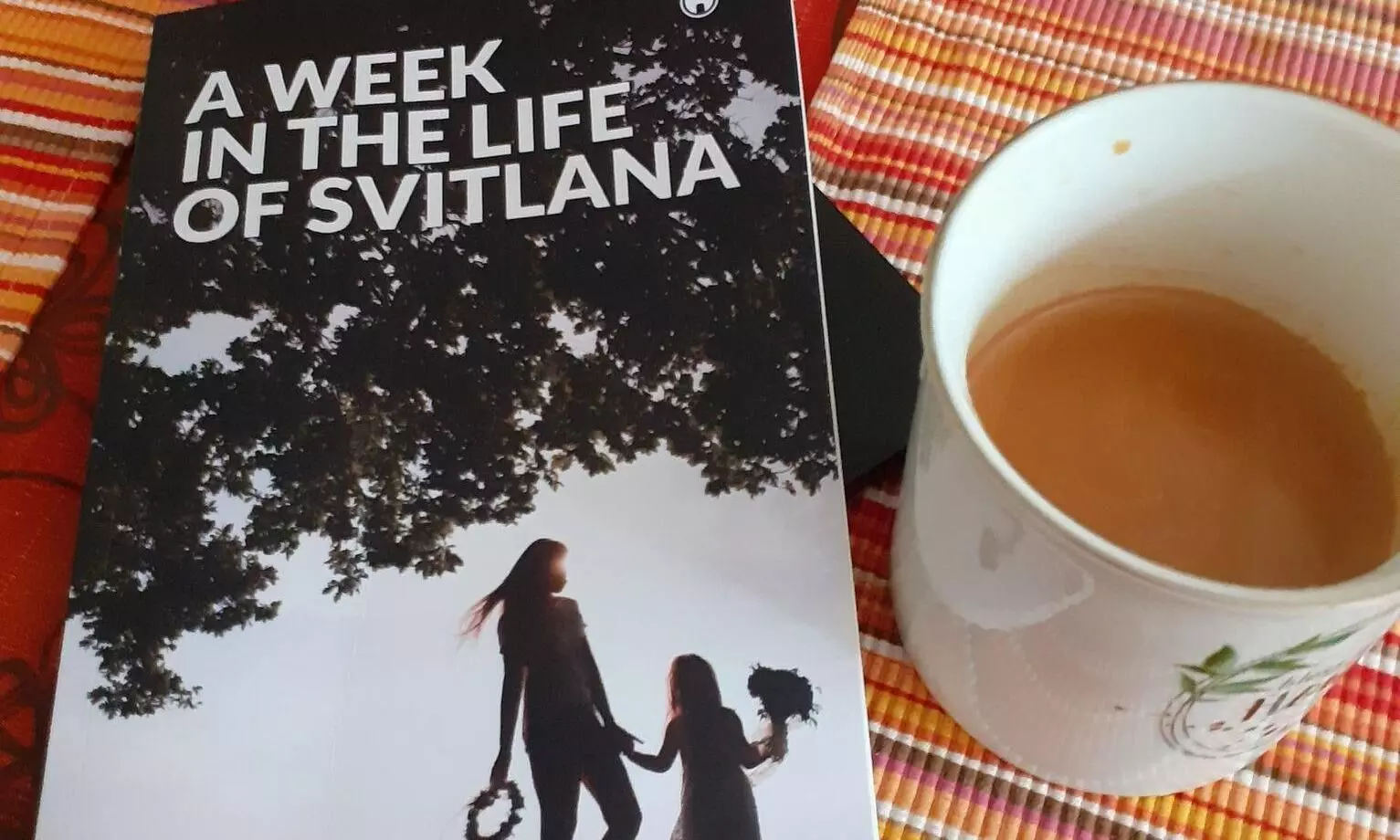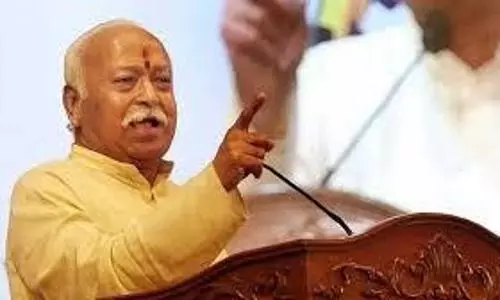

Reading 'A week in the life of Svitlana'
text_fieldsThe novel,'A week in the life of Svitlana' depicts the dilemma and contradictions one has to face to lead a life as an emigrant. The protagonist is away from her homeland, the emigrant is between two countries who is not ready to accept and share cultures though they are neighbors. This novel, authored by Indo-Russian writer Ajay Kamalakaran, passes through one week of life of Svitlana.
Svitlana, is the feminine epitome of urban Russian resident, passes through grave insecurity, internal strife, concerns, hope, utmost despair, and passion. She is twice divorced, her life moves through the interactions of three ladies.The story develops into a triangular relationship between mother and friend Veronica who are living in her homeland Ukraine and four year old Nellie. Looking after the child is the duty of Svitlana. Single parenthood and boring daily routines lead her to a fear of loneliness.
The trips many Ukranians frequent is the week of Svitlana. She finds it hard to face the political crises back home and its repercussion in Russia. The issues worry her and weaken her financially. She holds dual citizenship, but she could not be loyal to her mother land Ukraine and Russia the same degree. Genocide wars haunts her like any other Ukranian. Hence, though she is a staunch critic of Russia, she is not willing to give up her dual citizenship. It is simply for her existence.
Russia of today is not Soviet era Russia or a decade old Russia. Many visit this place. Many among theme are not aware of its diversity and energy. They visit red square, lakes and museums. But no one knows how the people outside the posh city are living.
Thanks to technology, the word has shrunk. Opportunities are open for those who are skilled.
However, the question, not only to Svitlana but to any migrant for that matter, is where he is loyal to. it is a crucial question. Are we loyal to out mother land or to the country which feeds us.?Invasion and survival.
Svitlana is a highly educated lady past her thirties. The socio-political culture in vogue is not conducive for her to get a suitable employment.Much to her disappointment, she is working as a sales girl in watch shop. Svitlana is keeping abreast of the issues around her and their contexts. She has well rounded political perspectives too. Ukraine and Russia have to deal with migrants from former USSR. The new migrants had to accept new culture and language. She feels she lost her self as she reached Russia.
These countries have not made slums or parallel social laws. Migrant Tajiks and Uzbeks reside in the very building resided by Soviets. And their students study in the same schools. Here, Svitlana regrets the culture is getting polluted.
The author Laila Seain with a paperback of 'A Week in the Life of Svitlana'
The rigmaroles in the immigration office where lot many documents are to submitted is a place of fear for the poor. Svitlana frets when some officers reply 'document is not complete.' She, on another occasion, shares her concern with Veronica about Russian education system.
"Nothing is going to change, we are living in this damn place where the educated can't speak English."
They tried to befool us eulogizing our education system. Certainly, car mechanics can quote Pushkin. But abroad, they can't order even for a coffee. They made sure that we should not know what happens outside, for that they made certain that we do not study English. They are scared of us talking to spies in English. Finns, Germans,Swedish are like Englishman. Even the French studied English. It is twenty five years since the USSR collapsed, even now they want us to be harebrained fools. She never lets any chance go for crticising and cursing Russian government or its inheritors.
She replied to someone asked her, 'then why don't you go home', why I bark like a dog. we should not allow matters to go further worse. We should raise a stand against injustice in our country." This way she displays her moral indignancy.
Moscow residents have understood the strife in Ukraine. Some staunchly criticised the illegal annexation of a part of Crimea. Some other jingoists found it a boon of mother land Russia. And they passed the buck of problems on Kieve. Svitlana has often been branded 'fascist' in many animated discussions. She was even branded 'racist' on another occasion. Once her friend addresses her dearly Banderovka, reminiscent of her Ukaranian leader Stepan Bandera. Stepan Bandera had worked together, in the beginning, with the Nazi German invading troops to Soviet Union. She tries to convince her friend, in the end Stepan was sent to a concentration camp by Nazis.
Ajay Kamalakkaran, author of 'A Week in the Life of Svitlana'
She accepted the laurel of 'Ukraine nationalist' joyfully. Like wise, she completely supports Euromaidan sabotage of Ukarian government in 1911. My father was a strong anti Nazi as well as anti fascist. He had actively participated in protests. Svitlana says to the friend.
Almost everyday she is addressed racist. She has friends from almost all races and colours. Her first marriage was even with a Muslim called Ahmed.
She erupts with anger often." Opposing Vladimir Putin would not make me fascist or racist".
She often question Russian attempts to make friendship with other countries. She satirises the attempts by Union to fight racism in South Africa.
"USSR supported African freedom fighters only because the West supported racists."She recalls the communal riot that erupted in a busy Biryulyovo suburb in 2013 where workers reside. It all started with the murder of a 25 year old Russian tribal man. He was killed by a migrant labor either from Caucases or Central Asia. Locals and nationalists led a protest against this. She rembers that they destroyed business establishments of migrants.
Svitlana's life reveals the unknown political and social anarchy of Russia. One day, she was murmuring to herself, as her daughter was playing, "Why can't they spare Ukranians. First Crimea robbed in cahoots with the anti nationalists hellbent on wealth gathering. Crimean anti nationalist thought they would get salary and pension from Russia. But they had a sudden shock. Putin and his cronies hatched a trouble in Donbass. It is true that, both Russians and Ukranians are very close. But they don't allow us to choose our own destiny."
Had anyone noticed her then, national TV channels would have misunderstood her indoctrinated jingoist or lunatic. Svitlana ardently believes that if a referendum is conducted people will choose to join Europen Union rather than the Russian backed Eurasan Economic Zone.
Her Chechen lover Marat's blind Russian patriotism pesters her often."I beleive, Chechnya should join with the mother land, as a Russian patriot. However, now it is part of Russia after the blood bath."
The miseries and other problems Chechniya had to undergo, as a result of two wars after the collapse of the Soviet Union, can only be attributed to Russia. It was this same country that expelled and banished many from Chechnya." They were completely destroyed, and now that tragic day is celeberated as Day of Man.
(L) Sri Lankan author and artist Sybil Wettasinghe releases Ajay Kamalakaran's book 'A Week in the Life of Svitlana' on November 5,2019 at latter's home in the Colombo suburb of Nugegoda
Uncared old age and economic anarchy.
The novelist depicts, in the novel, how capitalism and policy laxes affect the old people. One can see many old people with any support.
On her way back home after meeting her lover Marath, she chances on a good looking lady in her seventies in the metro. She is dejected and downcast. Sorrow was filled in that cool blue eyes. It made her wrinked cheek more beautiful. She was well dressed. She was reading Altai- Himalaya a book by philosopher and painter Roerich. The book was based on his travel to India through Central Asia. Svitlana reflected, she might have to elaborate about her unfulfilled dreams.
Why the beautiful eyes are a receptacle of sorrow.? A middle aged gentleman sitting next to her was inspiringly caricaturing her. He presented her with the complete picture. Then her blue eyes were lit, it made her more beautiful.
'Someone was kind to me after many years.' She said.
'Life after retirement is not filled with any requirements, especially when there is none to share with'
She embraced me gently before alighting from the train.
Svitlana was struck. Because she thought of the old age she has to confront, an old age frauhgt with solitude, an eerie solitude and uncared old age. She was frightened to know this is what is in store for her like many others in loneliness.
Another graphic depiction by the author is the rejection and indifference towards the old and associated helplessness. Svitlana meets an old lady who tries to sell, house reared roses, on the street. Actually she was tearfully begging. Her anser to Svitlana's question was pathetic.
'Pension is sufficient only to pay the bills, I am too impecunious to buy any food.'
Svitlana bought all the roses as a gesture of her assistance to the old lady. She thinks what the oil rich state shells out to its citizens. The news paper report, old people had to rely on just potatoes bought from small groceries to fill the stomachs, comes to her memory. Alaska and Norway receive fanciful assistance from rulers. But Moscow has adopted the most sharpest form of capitalism. The price rockets up but the filthy rich in Moscow are waltzing in luxurious parties travelling in luxurious cars. Then only she feels how terrible and haunting poverty and old age in Russia.
The modus operandi of dismantling of Russia has affected many in the contemporary society. The rich easily followed the western culture. Jingoism in former Soviet republic made the situation further worse. Russia- Ukariane geo political conflicts made many to rethink over loyalty and fidelity.
Woman in a male centric society
Political and economic insecurity and social anarchy compel her to criticise Putin. Though she holds strong political views like this, at the end of the day her aim is to provide a good life to her daughter. She is working as a sales in a watch showroom, albeit she holds a degree in law, confronts with all the issues a common man has to face in job and at personal level. Many years of socialism has made Russia a woman favorite place. But still it is a man centric place. Parental responsibility is the onus of woman. Though she is a free woman who wants jettison male centrism, she has a dual personality like her dual citizenship. She wants to run away from the males who mismanage lives and show irresponsibility, at the same time, she is in search of a middle aged gentleman who can assure economic safety to her.
When Veronica complains about lovers' roving eyes her response is exactly like any lady
'Men are men always'
Her life is full of hope, despair and anxiety. She always thinks the person who comes to her life should be a good father to her daughter Nellie. Though she knows her evanescent beauty can't attract any man to become her partner, but she feels some one will come unconditionally. At last she becomes sweetheart of the rich mandarin Marat. He presents himself as a divorcee and reticent before Svitlana. Later, she recognized his rough face, hollow personality and hypocrisy. Now she is totally collapsed. She laments sitting on a bench in the park totally incapable of even to survive. She cries out and comes back to real life with a balanced mind. Then at the end of that tense day, Svitlana plunges deep into her next week assignments and committments to her daughter
(Laila Saein is the director of Academic Forum for Research & Communication INDIA and works for Leadcap, Bangalore and Peace Gong Children's Newspaper,Delhi. This review earlier published in Madhyamam Weekly was translated by Sibahathulla Sakib)

















